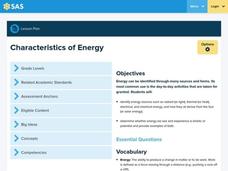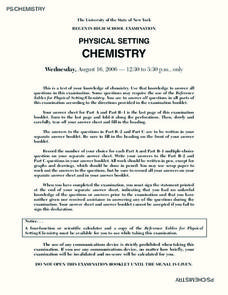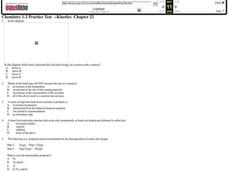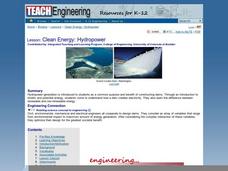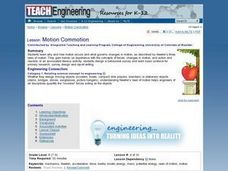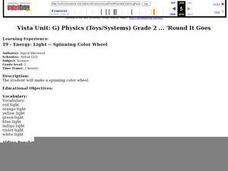Curated OER
Swinging Pendulum
Students engage in an activity which demonstrates how potential energy (PE) can be converted to kinetic energy (KE) and back again. Given a pendulum height, students calculate and predict how fast the pendulum will swing by understanding...
Purdue University
Rolling with Roller Coasters
Sometimes science is all fun and games! A hands-on STEM lesson plan asks learners to design and create models of roller coasters. They analyze the motion using a marble and describe the areas of maximum kinetic and potential energy.
Curated OER
Potential and Kinetic Energy
Sixth graders explore potential and kinetic energy. In this science activity, 6th graders assume the role of a roller coaster engineer and design a roller coaster. Students use their knowledge of kinetic and potential energy to design a...
Curated OER
Impulse, Momentum, and the Conservation of Momentum
What happens when two worlds collide? In the first of several activities, future physicists experiment with colliding ball bearings or Newton's cradle. Another activity requires the use of an air track with cars to examine collision....
Curated OER
Characteristics of Energy
Fourth graders view a video and create a KWL to identify energy sources. In this energy sources lesson, 4th graders explore the meaning of energy, kinetic energy, potential energy, thermal energy, radiant energy, and electrical energy....
Curated OER
Energy and Work: Transformation through Engines
Learners are introduced to the concept of thermodynamics. In groups, they participate in experiments in which they discover how potential energy converts into kinetic energy. They use the internet to research the components of a...
Curated OER
Energy and Work: Transformation Through Engines
Young scholars conduct a webquest on an energy source they chose. In this physics lesson, students design an experiment to determine the factors affecting potential and kinetic energy. They calculate speed and create distance vs. time...
Curated OER
Bounce Back - The Long and Short of It
Upper elementary scientists test basketballs with differing amounts of air to find if inflation affects bounce height. The lesson introduction poses the question of whether or not the composition of a ball determines bounce height, but...
Curated OER
Physical Setting: Physics Exam 2004
Twelve pages of mostly multiple-choice questions comprise this comprehensive New York Regents physics exam. It covers an entire year's worth of physics curriculum and requires about three hours for completion. Review the questions to...
Curated OER
Regents High School Examination PHYSICAL SETTING CHEMISTRY 2006
The 2006 version of the Regents High School Exam is just as thorough as the rest of them! Assess chemistry learners on an entire year's curriculum when they take this thirteen page test.
Curated OER
Kinetic Vs. Potential Energy
Eighth graders listen to a teacher lecture and observe a demonstration of both potential energy and stored energy. After discussing the characteristics and examples of different types of energy, 8th graders make predictions and then...
DiscoverE
Kinetic Sculpture
Let your creativity run wild. Scholars build a sculpture out of basic materials. These sculptures must be able to move in the wind (from an electric fan). However, they must also withstand the wind enough to not fall over—it's quite the...
Curated OER
What is Energy?
Youngsters take a look at the foods they eat, and how they provide energy for them to do things. They look at how body uses the food energy to create movement. Pupils also look at toys/devices in the room that need electrical energy...
Curated OER
Kinetics
In this kinetics worksheet, students review activation energy, rate of reaction, and reaction mechanisms. This worksheet has 13 multiple choice questions.
Curated OER
Clean Energy: Hydro-power
Students read about and discuss renewable and non renewable energy and identify how a dam produced energy using hydro-power. For this water energy lesson plan, students look at diagrams and pictures of water energy technology.
Carnegie Mellon University
Nuclear Energy
Extensive background material, clear objectives, and more are provided to help you teach an introduction to nuclear power. Learners will be able to explain how nuclear power is generated and how it compares to coal-created power. Provide...
Curated OER
Investigating Kinetic and Potential Energy
Students examine the differences between potential and kinetic energy. In this potential energy lesson plan students watch a video and complete an in class investigation.
Curated OER
Energy Detectives
Students explore where energy comes from and identify the different kinds of energy. In this energy lesson students search their classroom for energy connections and record the way that they use energy.
Curated OER
Science: Motion Commotion
Students examine Newton's three laws of motion to discover what causes it and how it changes. They conduct motion experiments by building catapults and constructing balloon rockets. Finally, they conduct peer studies correlating...
Curated OER
Where's the Energy
Students research energy conversions. In this energy lesson, students describe the basic operation of a steam engine. They explain the energy conversions in the steam engine's operation.
Curated OER
Momentum and Energy
Students study how to calculate momentum, kinetic, and potential energy. They apply each form of energy to real world situations including demonstrations, watching videos, and designing a Power Point presentation. They investigate in...
Curated OER
Energy Conversion
Sixth graders study energy conversions. They watch a demonstration of a working engine and make a chart explaining the energy conversions taking place. They build a simple electric motor and research other types of electric generators.
Curated OER
Making Energy "trails"
Students explore ten different stations that demonstrate either chemical, kinetic, or mechanical energy. They examine the way energy is transferred during each station's hands-on activity. Stations include vinegar and baking soda,...
Curated OER
Energy: Light -- Spinning Color Wheel
Second graders make spinning color wheels to determine how energy effects what colors look like. They paint or color a color wheel with the seven colors of the spectrum. Next, the spin the wheel to determine what happens. In order to...






